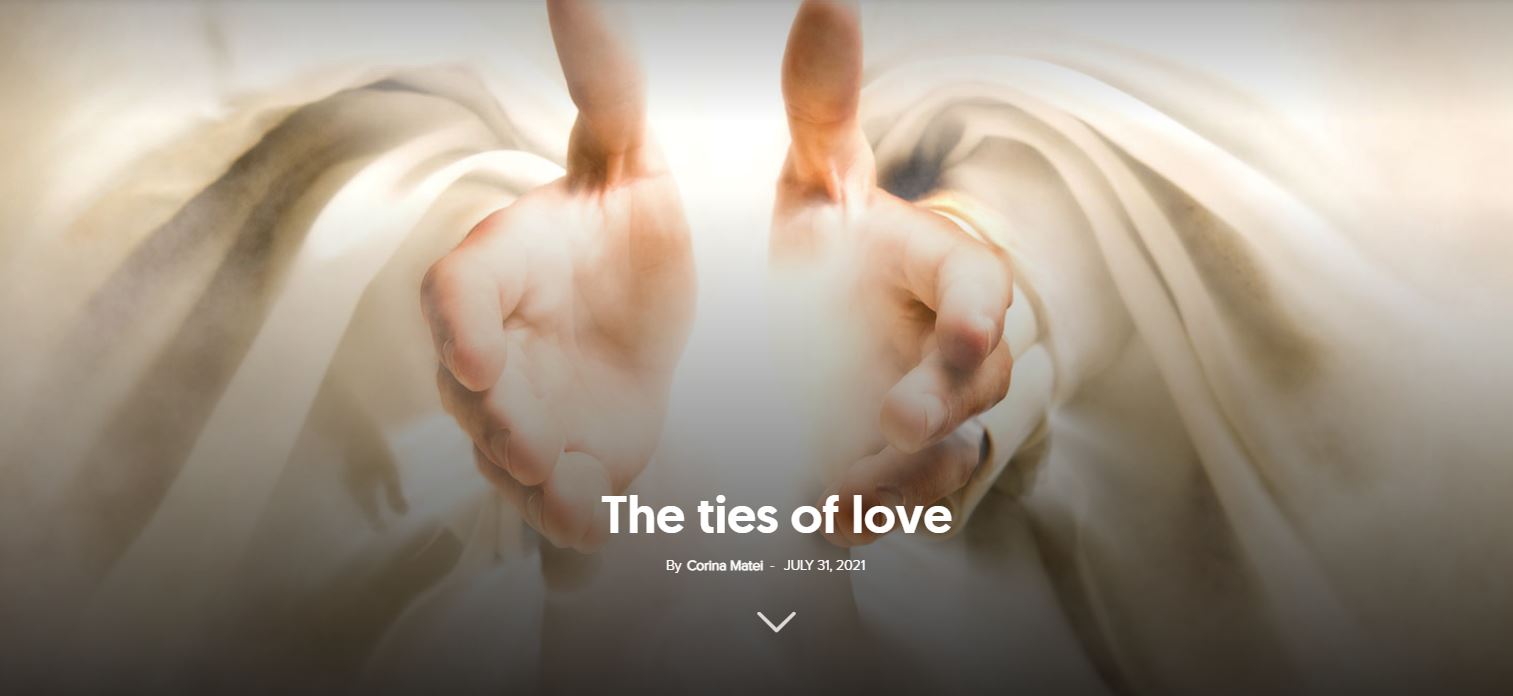In the book Love Beyond Reason, John Ortberg presents familiar and hidden nuances of a love that emerges revealingly from chapter to chapter, using lived out stories and biblical episodes, as well as familiar illustrations from literature.
Guided step by step between the facets of what the author claims to be a love beyond reason, the reader finally reaches the core of this love: God who has become ragged, descended to ragged people, whom He could not give up.
John Ortberg, having a PhD in clinical psychology at the Fuller Seminary, is a lecturer, Presbyterian pastor, and a writer well known to the public. He builds his book trying to find an answer, in the 12 chapters, to the question: How do you explain a love that cannot be explained? A love that invests in those who are impossible to love, transforms the untouchable, without ever depending on the value of its object but only on the merits of the One who offers it.
To illustrate the story of the two types of love—the love that seeks value in its object and the one that creates value—Ortberg uses the experience of his sister, Barbie, and her favourite doll, Pandy: a doll bought from a department store in Chicago, with a rubber face and hands and a body stuffed with fabric so that it would be soft to the touch.
Pandy was a rag doll, as the author calls it, one that had deteriorated over time to the point where it could no longer be sold or even given to anyone else. However, Barbie continued to love her doll with the same tenderness in the days of its decay as in the days when it was really shiny. She slept with it, brought it to the table, bathed with Pandy, and did not leave it behind at any time, not even on vacation.
On one occasion, the Ortberg family was forced to return to Canada, all the way from the border with Illinois, to the hotel where Pandy had been forgotten. Finally, when Barbie grew up and Pandy became a pile of rags, her mother kept the doll in a box (a privileged fate that no other toys were given). Twenty years later, when Barbie’s little girl reached the age when she wanted a doll, Pandy was taken to a doll hospital in California, where it was restored into the beautiful doll it once was.
What gave so much value to a ragged doll was obviously Barbie’s love for it (love that caused, in turn, those who loved the little girl to fall in love with the doll). Even when it had become a toy not worth keeping, Pandy was still loved, not because it was beautiful, but because Barbie loved it with a love that made it more beautiful than any other doll.
Starting from Pandy’s story, Ortberg examines two truths about human beings. The first is that we are rag dolls that have flaws, wounds, and rags that we try to camouflage with more or less skill. The second truth is that God does not love us with the kind of love that is offered only if it finds qualities in others that make them easy to love. We are loved by God with a love that gives us value, that transforms us from creatures torn by sin into priceless treasures.
This is the only kind of love that can give hope to rag dolls, says Ortberg. He recalls that the old English term for this way of loving is charity, a word that expresses love offered without merit, as a gift. As a matter of fact, true love always comes as a gift, says C. S. Lewis, pointing out that each of us has characteristics that cannot be loved naturally.
“It is no one’s fault if they do not so love it…You might as well ask people to like the taste of rotten bread or the sound of a mechanical drill,” says the British writer, noting that the love we receive from loved ones despite (also) having unlovable traits is owed to charity—because “Love Himself [Christ] is in” those who love us.
Using biblical events, lived stories, or episodes from the life of a literary character, Ortberg carefully dusts off ancient truths about the human-Divine relationship, bringing to light the characteristics of a love impossible to understand by human logic. It is a love that gives itself and serves the loved one (“For God so loved the world that he gave his one and only Son, that whoever believes in him shall not perish but have eternal life”—John 3:16).
It is a love that pays attention to us. Jesus noticed the invisible ones and stopped to listen to them and help them. “No one has ever seen like Jesus,” the author says. He saw the man born blind; He saw Zacchaeus in his hiding place; in a noisy crowd, where she could have easily been overlooked, He saw a woman who had been suffering for 12 years. A love that touches the untouchables, be they customs officers, lepers, or the uncircumcised. A love accessible to anyone in desperate need of it.
Above all, it is a love that helps us to start over, at any point in our experience, when we realize that we have failed miserably. We are dealing with the God of second chances. If there is one area in which we most often underestimate God’s love, then that is His desire to forgive, Ortberg says, contrasting our blindness with the obvious evidence that His favourite department is that of the lost and found. He is the one who looks for the lost coins, goes in search of the lost sheep, and runs to meet the prodigal son.
Ultimately, His love is not one that serializes us, but one that chooses each and every one of us: “I have summoned you by name; you are mine” (Isaiah 43:1). In a world of competitive individualism, in which we struggle to prove that we have a contribution to make, that we do not deserve to be rejected, the great news is that we are chosen, no matter how imperfect we may be.
The beauty of divine love is evident in the fact that no one is chosen to the detriment of another: “In God’s love, my chosenness never comes at anyone else’s expense. God chooses, or loves, each of his children with infinite uniqueness. His plan is for my chosenness to enhance the lives of others, not diminish them.” This is a truth illustrated by the call the people of Israel received—chosen not in spite of other people, but for the sake of the others, who were to be drawn to an invisible God through an incarnate community.
In the final chapters of the book, Ortberg explores the impact of divine love on the lives of those who allow themselves to be captivated by it. First of all, it is about the full assurance that we are the object of His watchfulness and care.
Although we live in the valley of the shadow of death, even though our world is full of violence, disease, and disaster, we are still completely safe in God’s hands. In fact, the Bible assures us that some of the most frightening places and contexts (the seven-fold heated fiery furnace, the lion’s den, prison, or a sea that is impossible to cross from one end to the other on foot) are proven to be very safe, thanks to the One who goes with His children.
The fact that we know ourselves to be in the hands of an almighty God gives us the freedom to grow, to take the risks inherent in the development process, and to trust in the One who cares even for the appearance of wild lilies and the food of the birds of the air. And, last but not least, it is the love of God that pushes us to find those who struggle with anxiety, with the feeling that they are not worthy of love, and to share with them the truth that our burning desire to be loved is only a faint echo of God’s desire to love us.
“Nothing you will ever do could make God love you more than He does right now,” as nothing we do causes Him to love us less, Ortberg says—a statement that shocks those who have spent their lives trying to earn the right to be loved. It’s a statement that could, in the same way, throw into the trap of cheap grace those who have not been touched and transformed by the love of the One who could not bear to live knowing that we were sentenced to death.
What brings God closer to our hearts, discerning fragments of His love, is that He has stripped Himself of His glory and clothed Himself as a servant. “Of all the gods of mythology, literature, and religion, this is the only ragged God,” Ortberg says.
Because we could not cross the abyss that separated us, He became a baby born in a manger, was insulted because of the circumstances of His birth, rejected by His people, mocked, beaten, and spat on, stripped and hung on a cross. His glory was manifested in His willingness to put on the rags of our nature and to suffer the worst that demons and men could come up with to humiliate and hurt Him.
The most tragic of the biblical characters is God Himself, so often disappointed and betrayed by His creatures, Elie Wiesel says. We often invest in others without knowing whether the good will be rewarded with evil, but Jesus knew that the deepest wounds would come from the hands of those His heart loved most. He was aware that His ministry would be misunderstood, that His suffering and death would be the object of public ridicule, that He would be forsaken or kept at a safe distance by His most beloved disciples.
And yet, He stepped on this path of pain and loneliness, marked by human ungratefulness and unworthiness, but sustained by an incomprehensible love, beyond all that our reason can understand or imagine.
Carmen Laiu is editor at ST.Network.




















